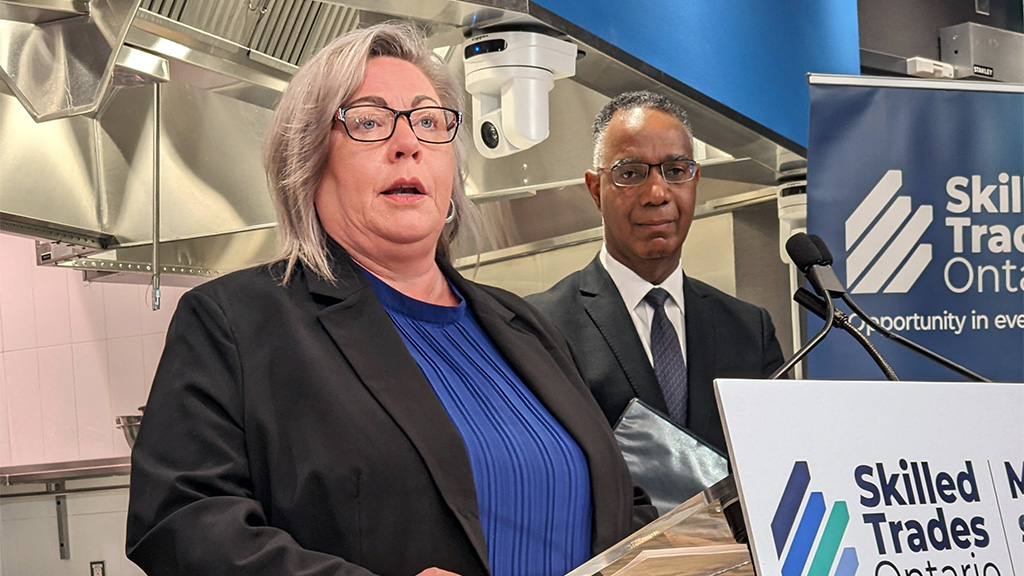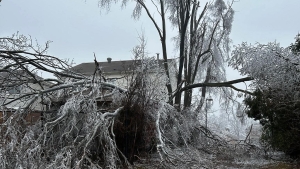It’s a chance to shape the future of trades education in Ontario.
That’s how Skilled Trades Ontario (STO) is framing its new Standards Industry Advisory Committees, which are inviting trades professionals to contribute their expertise and provide support as the agency develops and updates standards and examinations.
“This is an opportunity for trade professionals to make their mark on their trades,” said Melissa Young, CEO and registrar of STO.
The announcement was made March 29 at the George Brown College (GBC) Centre for Hospitality and Culinary Arts in Toronto.
Monte McNaughton, minister of labour, immigration, training and skills development, and Gervan Fearon, president of GBC, were also on hand for the event.
“Years ago, there were committees that worked on standards, curriculum as well as training standards and examinations,” said Young. “We’re really excited to put these back in place. It’s been a long time since industry has had involvement in this role and they are critical. It’s putting it back in the hands of industry.
“It will bring trades up to date in Ontario.”
Selected participants will be consulted through in-person or online workshops and online surveys.
Tasks could include reviewing examination content, skill competencies and learning outcomes. The committees will be facilitated and moderated by STO’s program development specialist.
“They will be asking committee members to advise on trade-specific details, fill in gaps and confirm industry trends and technologies,” Young explained.
“Our team will take that input into consideration when delivering a final standards product to the Ministry of Labour, Immigration, Training and Skills Development for final implementation with training delivery agents.”
“We want to ensure our standards reflect the diversity of the province and speak to trade professionals of all career levels, so we’re looking for folks who are passionate about their trade, have varying levels of experience and represent all of Ontario.”
In order to participate, experts working in the sector will require a variety of qualifications and skills including an up-to-date, broad knowledge of their trade with specific technical knowledge or experience; flexibility and commitment to dedicate time and energy to the task at hand; an unbiased attitude; the ability to support STO’s program development
specialists; be responsive to
requests; and possess communication skills.
“We do require people to have a certificate of apprenticeship, certificate of qualification or extenuating years of experience in the trade to make an application,” Young said. “You really must know that trade inside out.
“With what’s going on in the world today, especially here in Ontario on jobsites and the change in technology, in order for us to keep up to date with our standards and the training of new apprentices coming in we need them at the table to let us know what’s new, what’s changing in the industry, to make sure we are providing the best curriculum possible.”
This year, STO plans to review standards for a wide range of Red Seal and Ontario trades including brick layers, sprinkler and fire protection installers, welders and automotive service technicians.
Ontario Skilled Trades Alliance Chair Steven Crombie said he was pleased STO will be engaging with the industry. Also the manager of government relations for the Ontario Sewer and Watermain Association, he said there may be one caveat.
“The application process to participate on the standards and curriculum advisory panels almost seem to preclude policy experts at industry associations,” he noted. “There is one category where it is a binary option of either you’re working on the tools or you are a training instructor. There aren’t any other options.
“There is an entire ecosystem around those two binaries that are informing decisions, are engaged in how systems and processes are working.”
Andrew Pariser, vice-president at the Residential Construction Council of Ontario and a youth adviser with the minister of labour, training and skills development, pointed out the initiative pairs well with another one of STO’s mandates around labour market information.
“If they can take the labour market information and figure out which specialized skillsets, which careers, which trades are in demand, then they can use the industry advisory committees to then look at how we fill those needs,” he said. “I’m very hopeful that employers are going to play a really strong role on those committees.”
Ian Howcroft, CEO of Skills Ontario, called it a “positive move forward.”
“This will allow Skilled Trades Ontario to bring in the expertise and get the insight they need to help them do their role more effectively with having community support and community involvement,” he said. “This is another avenue for employers, for students, for others to get involved and engaged and provide their input and insight to come up with skills solutions.”
To apply click here.
Follow the author on Twitter @DCN_Angela











Recent Comments
comments for this post are closed